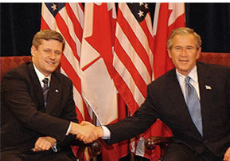
Harper, Bush Share Roots in Controversial Philosophy
What do close advisors to Stephen Harper and George W. Bush have in common? They reflect the disturbing teachings of Leo Strauss, the German-Jewish émigré who spawned the neoconservative movement.Strauss, who died in 1973, believed in the inherent inequality of humanity. Most people, he famously taught, are too stupid to make informed decisions about their political affairs. Elite philosophers must decide on affairs of state for us.
In Washington, Straussians exert powerful influence from within the inner circle of the White House. In Canada, they roost, for now, in the so-called Calgary School, guiding Harper in framing his election strategies. What preoccupies Straussians in both places is the question of "regime change."
Strauss defined a regime as a set of governing ideas, institutions and traditions. The neoconservatives in the Bush administration, who secretly conspired to make the invasion of Iraq a certainty, had a precise plan for regime change. They weren't out to merely replace Saddam with an American puppet. They planned to make the system more like the U.S., with an electoral process that can be manipulated by the elites, corporate control over the levers of power and socially conservative values.
